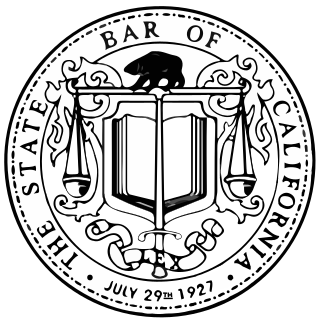Disbarment, also known as striking off, is the removal of a lawyer from a bar association or the practice of law, thus revoking their law license or admission to practice law. Disbarment is usually a punishment for unethical or criminal conduct but may also be imposed for incompetence or incapacity. Procedures vary depending on the law society; temporary disbarment may be referred to as suspension.
A bar association is a professional association of lawyers as generally organized in countries following the Anglo-American types of jurisprudence. The word bar is derived from the old English/European custom of using a physical railing to separate the area in which court business is done from the viewing area for the general public.

A charitable organization or charity is an organization whose primary objectives are philanthropy and social well-being.

Rufus Lige Edmisten is an American attorney who served as North Carolina Secretary of State, Attorney General, and was the Democratic nominee for Governor in 1984. He is currently a lawyer in private practice.

The State Bar of California is California's official attorney licensing agency. It is responsible for managing the admission of lawyers to the practice of law, investigating complaints of professional misconduct, prescribing appropriate discipline, accepting attorney-member fees, and financially distributing sums paid through attorney trust accounts to fund nonprofit legal entities. It is directly responsible to the Supreme Court of California, however, its Trustees are now appointed by the Supreme Court, the California Legislature, and Governor of California. All attorney admissions are issued as recommendations of the State Bar, which are then routinely ratified by the Supreme Court. Attorney discipline is handled by the State Bar Office of Chief Trial Counsel, which acts as prosecutor before the State Bar Court of California.

James Crawford Biggs was an American lawyer and politician, born in Oxford, North Carolina to William and Elizabeth Arlington (Cooper) Biggs.
Wade Barber is a lawyer, retired judge, and former prosecutor currently practicing law in Pittsboro, North Carolina. Judge Barber served as Senior Resident Superior Court Judge for North Carolina Judicial District 15B from 1998-2006. He returned to private practice in June 2007, and his daughter, Elizabeth Barber, joined the practice in March 2010. The two now practice as Barber & Barber, PLLC.
The Federal Bar Association (FBA) is the primary voluntary professional organization for private and government lawyers and judges practicing and sitting in federal courts in the United States. Six times a year, The Association prints The Federal Lawyer, which includes the latest news of interest to the federal legal community. The magazine features articles by attorneys and judges, book reviews, the latest Supreme Court rulings, judicial profiles, and thorough coverage of FBA activities.
The State Bar of Arizona is the integrated (mandatory) bar association of the U.S. state of Arizona. The Arizona Supreme Court licenses lawyers, while the State Bar administers the regulation of the practice of law. The State Bar, under the direction of the Court, establishes procedures for the discipline of lawyer misconduct and provides education and development programs for the legal profession and the public. Through the Rules of The Supreme Court of Arizona, the privilege to practice law in Arizona is granted solely to "active member[s] of the state bar."
The Washington State Bar Association (WSBA) operates under the delegated authority of the Washington Supreme Court to license the state's nearly 41,000 active and inactive lawyers and other legal professionals. In furtherance of its obligation to protect and serve the public, the WSBA both regulates lawyers and other legal professionals and serves its members as a professional association — all without public funding. The WSBA's mission is to serve the public and the members of the Bar, to ensure the integrity of the legal profession, and to champion justice.

The Integrated Bar of the Philippines (IBP) is the national organization of lawyers in the Philippines. It is the mandatory bar association for Filipino lawyers.

The Alabama State Bar is the integrated (mandatory) bar association of the U.S. state of Alabama.
The New York County Lawyers Association (NYCLA) is a bar association located in New York City.

The Pennsylvania Bar Association (PBA) is a voluntary bar association of lawyers and law students in Pennsylvania, United States. The association offers membership benefits, including publications, practice support, networking, and continuing education.
The Alaska Bar Association is a mandatory bar association responsible for the Alaska Supreme Court and for the admission and discipline process of attorneys for the state of Alaska.
The Louisiana State Bar Association (LSBA) is the integrated (mandatory) bar association of the U.S. state of Louisiana. The mission of the Louisiana State Bar Association is to assist and serve its members in the practice of law, assure access to and aid in the administration of justice, assist the Supreme Court in the regulation of the practice of law, uphold the honor of the courts and the profession, promote the professional competence of attorneys, increase public understanding of and respect for the law, and encourage collegiality among its members.
The North Carolina State Bar (NCSB) is the state agency charged with regulating the practice of law in the U.S. state of North Carolina. In contrast, the North Carolina Bar Association is a voluntary association.

The Colorado State Bar Association (CBA), founded in 1897, is a voluntary bar association for the state of Colorado. There are 26 local bars within the organization. The CBA works for the common interests of attorneys and judges and is a non-profit organization. It has 30 sections and 18 committees which cover diverse specialties of the law. Each section offers members a closer association with other professionals engaged in a similar legal specialty.
The Maine State Bar Association (MSBA) is a voluntary bar association for the state of Maine.
The Maryland State Bar Association (MSBA) is a voluntary bar association for the state of Maryland.







